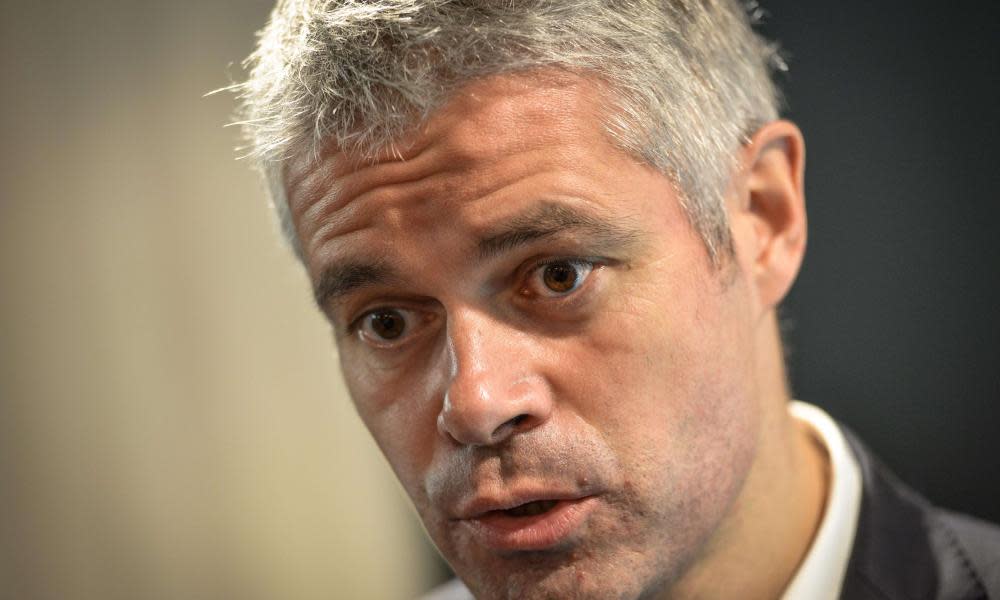France's opposition set to lurch toward far right by electing new leader

France’s bitterly divided conservative opposition party is expected to elect a new hardline leader on Sunday marking a move away from centre ground toward the territory of the far right.
Barring a last minute disaster, Laurent Wauquiez will take control of Les Républicains (LR) party after its disastrous performance in the presidential election earlier this year when its candidate, François Fillon, failed to make it into the second round vote.
Wauquiez has run a hawkish leadership campaign running on an anti-immigration, anti-welfare programme and has worried some party heavyweights with his possible “porosity” to far-right Front National ideas. He refused to call supporters to back Emmanuel Macron against the FN’s leader, Marine Le Pen, in the second round of the presidential vote in May.
The electronic vote is open to nearly 235,000 party members. There are two other largely unknown candidates, but members are expected to give Wauquiez, 42, a clear victory, making a second round vote unnecessary.
Wauquiez is expected to consolidate his victory by appointing a youthful shadow cabinet to challenge Macron and raise the party from what he described as the ruins of its presidential catastrophe.
His hard-right line does not, however, have unanimous support. Franck Riester, a former LR member of parliament has left the party accusing Wauquiez of playing into the FN’s hands.
“By running after the Front National, we will end up by giving the far right power,” Riester said recently.
Valérie Pécresse, a former budget minister under Nicolas Sarkozy and influential leader of the Ile de France region, said Wauquiez’s victory could shrink, or at worst, destroy LR.
“It’s a risk. To avoid it we have to accept our differences and not try to bury them,” she has said.
Pecresse said the party had to learn the lesson of its defeats in 2012, when Sarkozy lost the presidential election to Socialist François Hollande, and 2017, when Fillon’s chances were destroyed by a financial scandal. Above all, she said, it had to avoid being a conduit for FN ideas.
“Each time there’s the reflex to creep towards the hardcore right,” she said. There should be no “porosity with the Front National … That’s a red line. If the right ends up on that slippery slope then it’s no longer my right.”
Until now, the LR, previously led by Sarkozy, had followed the centre-right tradition that has been a dominant force in French politics, providing an umbrella for centrists, economic liberals and those who leaned further to the right.
Macron, however, has captured the centre ground in French politics and headhunted some of the LR’s emerging stars, including his prime minister, Édouard Philippe, and budget minister, Gérald Darmanin.
Wauquiez, a devout Catholic, supports economic protectionism and state intervention to regulate the economy, takes a tough line on immigration and social welfare – he considers France’s social model obsolete – the 35-hour maximum working week and is opposed to same sex marriage and IVF.
He has promised “intransigent secularism” seen as anti-Islam, and believes France should not have to apologise for events in its past, all subjects that echo with the far right, though he recently rejected doing any deals with the FN.
Hervé Gattegno, the editor of the Le Journal du Dimanche and a political commentator, said Wauqiuez risked pushing more moderate conservatives into the arms of Macron’s ruling La République en Marche.
“The more radical Laurent Wauquiez becomes, the more the centrist and moderate LRs are tempted to rally to the president. So it’s a strategy of making the right more extreme, which doesn’t seem to be to be very clever.
“Perhaps he hasn’t understood what most [centre] right voters have and what all the opinion polls reveal: the real head of the [centre] right is, for the moment, in the Elysée. It’s Emmanuel Macron,” Gattegno told Europe1 radio.

 Yahoo News
Yahoo News 
